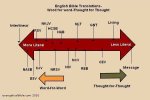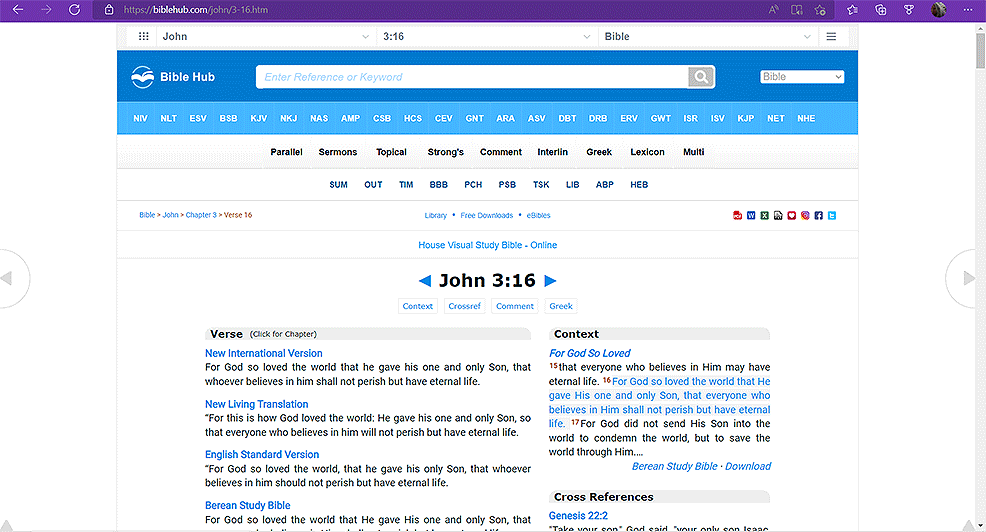WHY DO WE HAVE SO MANY BIBLE TRANSLATIONS?
Why are there so many Bible translations, and which is the best?
[2:43]
Old Testament:
The Old Testament is less debated due to the extreme painstaking care of the Hebrew Scribes and the Hebrew people to protect their Holy Scriptures. Most, if not all, translate from Masoretic Text, The Septuagint, The Dead Sea Scrolls, and a few more.
New Testament:
The New Testament, on the other hand, is debated quite frequently due to the methods and opinions below.
Textual criticism / Critical Text:
Note: video promotes the NIV, but the newer NIV has strayed away from translation accuracy.
[6:25]
Majority Text:
“The Majority Text, also known as the Byzantine and Ecclesiastical Text, is a method of determining the original reading of a Scripture by discovering what reading occurs in a majority of the manuscripts. The Majority Text method within textual criticism could be called the “democratic” method. Essentially, each Greek manuscript has one vote, all the variants are voted on by all the manuscripts, and whichever variant has the most votes wins.” — https://www.gotquestions.org/majority-text.html
The Textus Receptus:
“The Textus Receptus (Latin for “Received Text”) is a Greek New Testament that provided the textual base for the KJV.”
—https://www.gotquestions.org/Textus-Receptus.html
The Textus Receptus was created between 1516 and 1633. It was created by Erasmus, who gathered what manuscripts he had at his disposal, which came from the Byzantine family of manuscripts. The Byzantine family holds the largest number of manuscripts but by no means the oldest. The Textus Receptus used the majority text approach, using manuscripts dated roughly between the 5th and 12th centuries A.D. So basically, starting 400 years after Jesus's birth. The KJV used the Masoretic Text for the Old Testament and the Byzantine family for the New Testament.
Alexandrian family Text:
Modern translations 1900s until current have included the Alexandrian family of manuscripts which includes Codex Alexandrinus and Codex Vaticanus, it is one of the earliest (both range within the 4th century A.D. or between 300 to 400 A.D.) and most complete manuscripts of the Bible, it also contains the oldest complete copy of the New Testament.
So the debate of which translation is better often falls on the opinions people hold on the manuscripts used and which translation method we are about to look at.
METHODS OF INTERPRETATION
Interlinear:
The interlinear is a word for word Greek/Hebrew to English using the most reliable sources.
Word for Word:
Word for word is a translation strategy that looks at each individual word in comparison to the original language, much like the interlinear but only showing the translators chosen English word like the KJV, ESV, or NASV.
Thought for Thought:
Thought for thought is a translation strategy that takes the understanding of the manuscript's words and translates the idea of the verse into modern English. For example, the NLT or CEV.
Paraphrase:
On the far end of the thought for thought spectrum will be the MSG or Message Bible, which paraphrases chapters.

Examples of why translation matters:
“In March 2011, the publisher of the NIV, Zondervan, issued a new edition, the 2011 New International Version. This edition replaced the 1984 NIV, which will no longer be published. Like its predecessor, the TNIV, the 2011 NIV was translated using gender-neutral translation rules, resulting in the replacement of gender-specific words (e.g. man, woman, he, she, son, daughter) with gender-neutral words (e. g. person, they, child). In many cases these replacements are made even when the original language clearly intends a specific gender.” — https://www.gotquestions.org/New-International-Version-NIV.html
In Hebrews 11:6, we find faith and belief required by the believer. Using the Word for Word and interlinear methods, we see the importance.
Hebrews 11:6 ESV 6 And without faith it is impossible to please him, for whoever would draw near to God must believe that he exists and that he rewards those who seek him.
Faith and believe sound similar, but in Greek, they are the words pistis and pisteuo which carry similar but different meanings.
Pistis is considered God’s gift of faith.
Pisteuo is our response to God.
Why does this matter? Because some argue against the free will of humanity.
Conclusion:
These notes are the basics and gives the reader a foundation to dig deeper or be content in knowing that despite the debates and different approaches, we have many excellent and accurate translations. From the KJV to the NLT, the scriptures and thoughts are very similar, and only sometimes, in deep study, will you find where a word translation is better.
How to safely study the Word:
Always do a parallel scripture study. For example, in Bible Gateway under the verse, you will see Hebrews 11:6 in all English Translations. Click on that link and then look through your favorite translations to see if any significantly differ.

If they differ, then dig into the words themselves using an interlinear version.
Which translation do I prefer?:
I like the Word for Word and Critical text methods.
I believe the words used in scripture were chosen very carefully and inspirational to the truth. I believe a textual criticism or Critical text method is superior due to modern technology, newer archaeological discoveries, and its pursuit to use manuscripts closest to the originals.
Word for Word translations like the ESV, NASB, NKJV, and the NRSV are my favorites due to modern English and a modern update for textual criticism.
Why are there so many Bible translations, and which is the best?
[2:43]
Old Testament:
The Old Testament is less debated due to the extreme painstaking care of the Hebrew Scribes and the Hebrew people to protect their Holy Scriptures. Most, if not all, translate from Masoretic Text, The Septuagint, The Dead Sea Scrolls, and a few more.
New Testament:
The New Testament, on the other hand, is debated quite frequently due to the methods and opinions below.
Textual criticism / Critical Text:
Note: video promotes the NIV, but the newer NIV has strayed away from translation accuracy.
[6:25]
Majority Text:
“The Majority Text, also known as the Byzantine and Ecclesiastical Text, is a method of determining the original reading of a Scripture by discovering what reading occurs in a majority of the manuscripts. The Majority Text method within textual criticism could be called the “democratic” method. Essentially, each Greek manuscript has one vote, all the variants are voted on by all the manuscripts, and whichever variant has the most votes wins.” — https://www.gotquestions.org/majority-text.html
The Textus Receptus:
“The Textus Receptus (Latin for “Received Text”) is a Greek New Testament that provided the textual base for the KJV.”
—https://www.gotquestions.org/Textus-Receptus.html
The Textus Receptus was created between 1516 and 1633. It was created by Erasmus, who gathered what manuscripts he had at his disposal, which came from the Byzantine family of manuscripts. The Byzantine family holds the largest number of manuscripts but by no means the oldest. The Textus Receptus used the majority text approach, using manuscripts dated roughly between the 5th and 12th centuries A.D. So basically, starting 400 years after Jesus's birth. The KJV used the Masoretic Text for the Old Testament and the Byzantine family for the New Testament.
Alexandrian family Text:
Modern translations 1900s until current have included the Alexandrian family of manuscripts which includes Codex Alexandrinus and Codex Vaticanus, it is one of the earliest (both range within the 4th century A.D. or between 300 to 400 A.D.) and most complete manuscripts of the Bible, it also contains the oldest complete copy of the New Testament.
So the debate of which translation is better often falls on the opinions people hold on the manuscripts used and which translation method we are about to look at.
METHODS OF INTERPRETATION
Interlinear:
The interlinear is a word for word Greek/Hebrew to English using the most reliable sources.
Word for Word:
Word for word is a translation strategy that looks at each individual word in comparison to the original language, much like the interlinear but only showing the translators chosen English word like the KJV, ESV, or NASV.
Thought for Thought:
Thought for thought is a translation strategy that takes the understanding of the manuscript's words and translates the idea of the verse into modern English. For example, the NLT or CEV.
Paraphrase:
On the far end of the thought for thought spectrum will be the MSG or Message Bible, which paraphrases chapters.

Examples of why translation matters:
“In March 2011, the publisher of the NIV, Zondervan, issued a new edition, the 2011 New International Version. This edition replaced the 1984 NIV, which will no longer be published. Like its predecessor, the TNIV, the 2011 NIV was translated using gender-neutral translation rules, resulting in the replacement of gender-specific words (e.g. man, woman, he, she, son, daughter) with gender-neutral words (e. g. person, they, child). In many cases these replacements are made even when the original language clearly intends a specific gender.” — https://www.gotquestions.org/New-International-Version-NIV.html
In Hebrews 11:6, we find faith and belief required by the believer. Using the Word for Word and interlinear methods, we see the importance.
Hebrews 11:6 ESV 6 And without faith it is impossible to please him, for whoever would draw near to God must believe that he exists and that he rewards those who seek him.
Faith and believe sound similar, but in Greek, they are the words pistis and pisteuo which carry similar but different meanings.
Pistis is considered God’s gift of faith.
Pisteuo is our response to God.
Why does this matter? Because some argue against the free will of humanity.
Conclusion:
These notes are the basics and gives the reader a foundation to dig deeper or be content in knowing that despite the debates and different approaches, we have many excellent and accurate translations. From the KJV to the NLT, the scriptures and thoughts are very similar, and only sometimes, in deep study, will you find where a word translation is better.
How to safely study the Word:
Always do a parallel scripture study. For example, in Bible Gateway under the verse, you will see Hebrews 11:6 in all English Translations. Click on that link and then look through your favorite translations to see if any significantly differ.

If they differ, then dig into the words themselves using an interlinear version.
Which translation do I prefer?:
I like the Word for Word and Critical text methods.
I believe the words used in scripture were chosen very carefully and inspirational to the truth. I believe a textual criticism or Critical text method is superior due to modern technology, newer archaeological discoveries, and its pursuit to use manuscripts closest to the originals.
Word for Word translations like the ESV, NASB, NKJV, and the NRSV are my favorites due to modern English and a modern update for textual criticism.
-
2
-
1
- Show all




